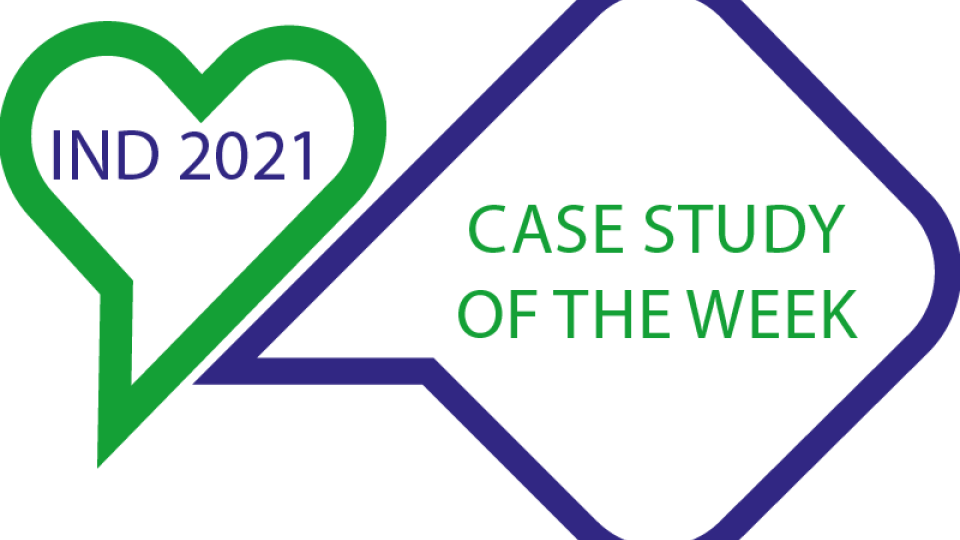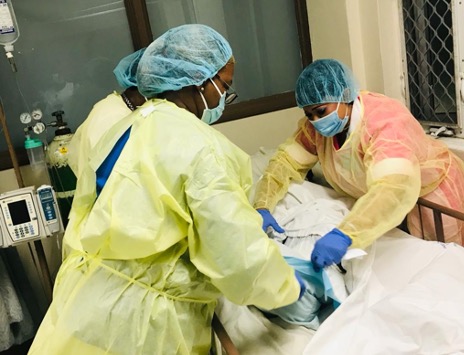Nurses’ Stress: “COVID-19 is scary, just like a roller-coaster”

Contributor: Rosemarie L. Josey, Clinical Nurse Specialist, Bahamas
Clinical Nurse Specialist Rosemarie Josey had never imagined being faced with the possibility of battling a deadly virus and the amount of stress that would incur. One of her greatest fears was placing her family members at risk of contracting the virus because of her exposure to COVID-19 in the workplace. The limited amount of personal protective equipment made Rosemarie feel vulnerable and infuriated during the first wave of the COVID-19 pandemic, particularly because of limited training and knowledge of transmission.
Rosemarie is the “go-to” person, problem solver, counsellor, advisor and caretaker. Providing mentorship with a senor sense of humour when appropriate is what she does best to help patients and colleagues deal with stressful situations. Junior nurses, staff members and colleagues were reliant on her to advocate on their behalf, and to provide that strong leadership support to help alleviate their fears.
To reduce stress levels and fears among colleagues in the workplace, they had meaningful discussions on ethical dilemmas around protecting the confidentiality and rights of their patients and staff members, which resulted in developing critical thinking skills for good decision-making.
At times, Rosemarie felt hopeless in the work environment as she witnessed nurses, physicians, other healthcare professionals and custodians on home quarantine, self-isolating. Colleagues were on the frontlines with minimal protection, interacting with patients/clients with multiple illnesses, and not knowing if an asymptomatic patient was COVID-19 positive. The complex care and management of these patients involves a multidisciplinary approach.
In the words of one of the nurses in the Bahamas who succumbed to COVID-19 at home in self-isolation, “It’s like a roller coaster. It is not easy having COVID-19. It is scary to breathe, you have no appetite. Everything is normal one minute and then you lie in bed struggling to breathe and face the reality that you may not survive this”.
One of Rosemarie’s family members experienced similar COVID-19 symptoms of mild to severe difficulty breathing, low oxygen saturation, fainting, diarrhoea, fatigue, body aches, headaches, and loss of taste and smell. His condition quickly deteriorated, and he was intubated and mechanically ventilated. He struggled for survival in a critical care facility assigned to managing critically ill patients who tested positive for the virus. During his hospital stay, he experienced acute respiratory distress syndrome, renal failure, elevated blood pressure and high blood glucose levels. His medical condition and extended use of the ventilator made it necessary for him to have a tracheostomy tube inserted. With expert care from the team of committed and dedicated physicians, nurses, healthcare professionals, and family support, he survived his ordeal miraculously after a month of hospitalization. Many nurses who have tested positive for COVID-19 have survived the experience, while sadly a few have not.
It was reported by the Bahamian health officials during the second wave of COVID-19 in August 2020 that more than 400 health care workers were exposed to this deadly coronavirus. Rosemarie was also quarantined at home for 14 days after her exposure to a patient who tested positive for coronavirus. She was assessed as high risk after being interviewed by the doctor and answering the established protocol questionnaire. She described her experience as a “scary, hopeful, prayerful” time. She tested negative for COVID-19. About a week later she began experiencing flu-like symptoms of low-grade fever, headaches, joint pain, loss of taste, loss of appetite, cough, mild shortness of breath, and extreme fatigue. She was very anxious another time of self-isolation, taking her prescribed medications and adhering to the national protocols. Luckily, a second negative result was confirmed.
Nurses are working everyday with their heart and soul, putting their lives in jeopardy while caring for patients. “The heartbeat of a warrior nurse lies within each of us,” says Rosemarie “Guided by our instinct between the art and science of nursing, the future of nursing will be determined by our collaborative approach to scientific data collection, sharing of information and experiences, making critical decisions not based on emotions but on science to influence national health policy and the Sustainable Development Goals. Nurses are powerful and resilient as we continue to work on the frontline and advocate for increased investments in nursing and midwifery.”
